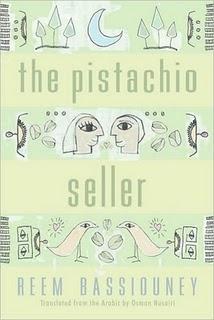The Pistachio Seller

“How does a woman fall in love?” The opening line of Reem Bassiouney’s The Pistachio Seller is dangerously full of clichéd melodrama and trite gender assumptions; however, Bassiouney avoids these pitfalls by presenting complicated characters who exhibit the complexity of religion, love, and belief.
Bassiouney explains the significance of the pistachio in an Author’s Note, which reveals the historical significance of the pistachio and ties the nut to a very real cultural context. Pistachios are the most expensive nuts in Egypt. Because they are usually exported from abroad, until the capitalist movement of the 1990s, the pistachio was banned. Setting the novel in contemporary Egypt, the pistachio represents indulgence, luxury, and the perceived weakness of the East for pleasures from the West. The Pistachio Seller opens with young Wafaa falling in love with her cousin, Ashraf. Educated in England, Ashraf feels a disdain for the poverty, tradition, and "backwardness" of Egypt, and offers pistachios to all as though he could offer a taste of a better life. Wafaa expresses her confusion of desire and pride: “Was is really vital for East Germany to taste bananas? Were bananas worth all this humiliation? So what if man has to live without bananas? We could live without pistachios and without bananas.”
A devout Muslim, Wafaa desires Ashraf, but hates herself for lusting. Her desire is driven by imagination, prejudice, and the unachievable. This is where the beauty of Bassiouney’s complex characters shines. No character is singularly blameless or nefarious. Do I love Wafaa for being honest and passionate, or hate her for being judgmental and dogmatic?
I’m conflicted about the novel’s conclusion and Wafaa’s character development. The Pistachio Seller takes an epistolary turn when Ashraf moves to the U.S. While Ashraf writes honest, often self-pitying letters, Wafaa’s love letters are erratic, revealing little of her life. While Wafaa’s rhetoric changes, it seems her impulses do not.
Bassiouney does not compromise the novel’s tone by romanticizing the U.S., or portraying it as a home for Ashraf in exile. As is true with many elements in The Pistachio Seller, the U.S. proves to be a conflicted indulgence, like pistachios, enticing one away from one's homeland and offering little in return but ephemeral pleasure. Wafaa says, “Luxury living was like a drug you could get addicted to: it would control the cells of your brain, and you could not will it away.”
The Pistachio Seller is Bassiouney’s fourth novel; however, the first three are not yet translated into English. I hope The Pistachio Seller holds the promise of more translated novels from Bassiouney in the future.